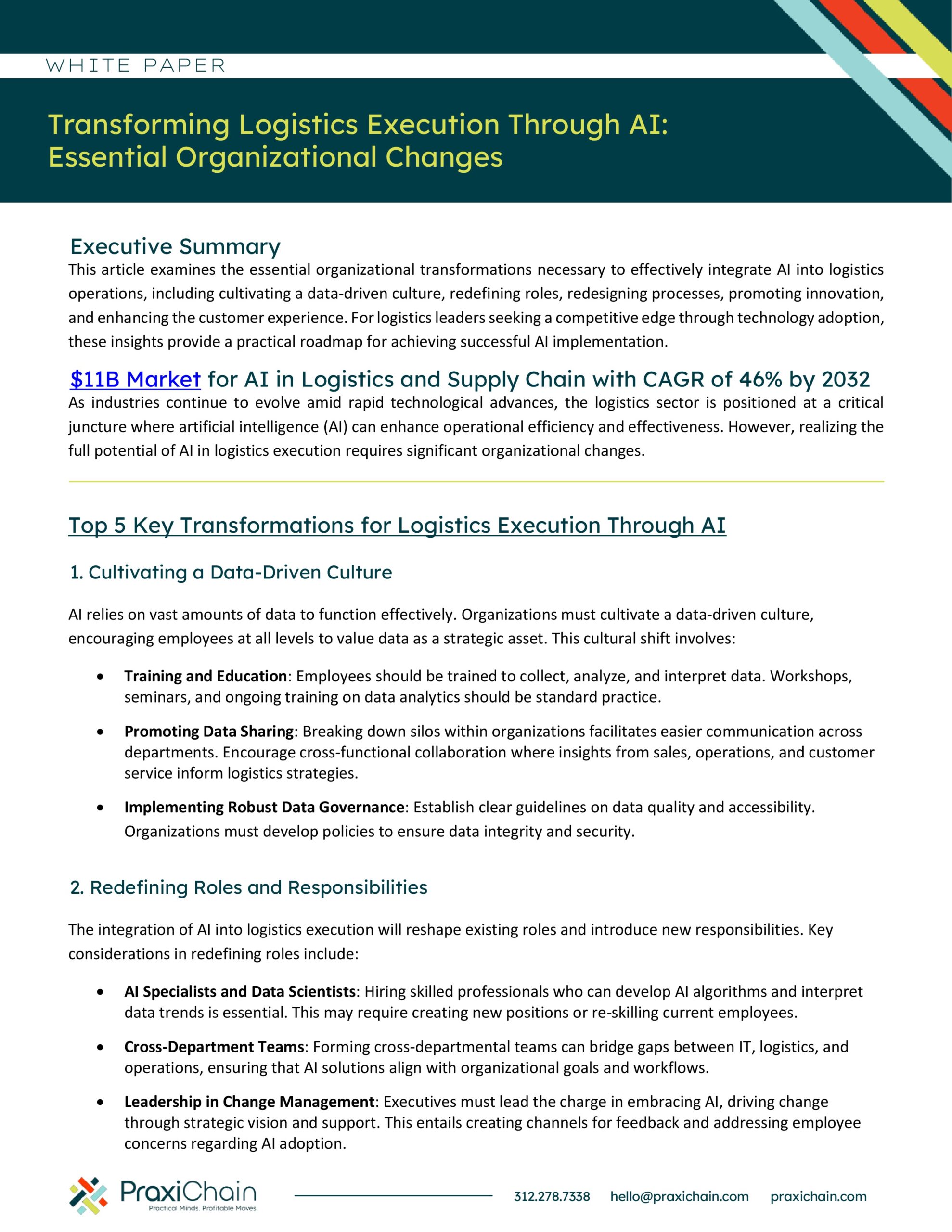By Chris Adderton
Executive Summary
This article examines the essential organizational transformations necessary to effectively integrate AI into logistics operations, including cultivating a data-driven culture, redefining roles, redesigning processes, promoting innovation, and enhancing the customer experience. For logistics leaders seeking a competitive edge through technology adoption, these insights provide a practical roadmap for achieving successful AI implementation.
$11B Market for AI in Logistics and Supply Chain with CAGR of 46% by 2032
As industries continue to evolve amid rapid technological advances, the logistics sector is positioned at a critical juncture where artificial intelligence (AI) can enhance operational efficiency and effectiveness. However, realizing the full potential of AI in logistics execution requires significant organizational changes.
Top 5 Key Transformations for Logistics Execution Through AI
- Cultivating a Data-Driven Culture
AI relies on vast amounts of data to function effectively. Organizations must cultivate a data-driven culture, encouraging employees at all levels to value data as a strategic asset. This cultural shift involves:
- Training and Education: Employees should be trained to collect, analyze, and interpret data. Workshops, seminars, and ongoing training on data analytics should be standard practice.
- Promoting Data Sharing: Breaking down silos within organizations facilitates easier communication across departments. Encourage cross-functional collaboration where insights from sales, operations, and customer service inform logistics strategies.
- Implementing Robust Data Governance: Establish clear guidelines on data quality and accessibility. Organizations must develop policies to ensure data integrity and security.
- Redefining Roles and Responsibilities
The integration of AI into logistics execution will reshape existing roles and introduce new responsibilities. Key considerations in redefining roles include:
- AI Specialists and Data Scientists: Hiring skilled professionals who can develop AI
algorithms and interpret data trends is essential. This may require creating
new positions or re-skilling current employees. - Cross-Department Teams: Forming cross-departmental teams can bridge gaps between IT, logistics, and operations, ensuring that AI solutions align with organizational goals and workflows.
- Leadership in Change Management: Executives
must lead the charge in embracing AI, driving change through strategic vision
and support. This entails creating channels for feedback and addressing
employee concerns regarding AI adoption.
- AI Specialists and Data Scientists: Hiring skilled professionals who can develop AI
- Redefining Processes and Systems
To leverage AI for improved logistics execution, organizations must rethink their existing processes and systems. This can be achieved through:
- Automating Routine Tasks: Identifying repetitive manual tasks that can be automated through AI technologies allows resources to focus on strategic initiatives. Examples include automating inventory management and demand forecasting.
- Integrating AI Solutions: Organizations should invest in modern logistics management systems that seamlessly incorporate AI functionalities, including transportation management systems (TMS) and warehouse management systems (WMS) equipped with predictive analytics.
- Embracing Agile Methodologies: To truly harness the power of AI, organizations must adopt agile methodologies, enabling them to adapt strategies based on data-driven insights quickly.
- Fostering Innovation and Experimentation
The dynamic nature of logistics necessitates that organizations remain open to new ideas and experimentation. Leaders should encourage innovation by:
- Creating a Safe Space for Innovation: Allow teams to test new concepts without fear of failure. Pilot projects can provide invaluable insights into how AI can be
applied effectively. - Collaborating with Startups and Tech Companies: Building partnerships with tech firms can open doors to cutting-edge AI solutions. Collaboration fosters innovation, allowing organizations to leverage external expertise.
- Continuous Learning and Improvement: Promoting a mentality of ongoing learning encourages teams to stay updated on industry trends and technological advancements. This continuous improvement mindset is vital for AI integration.
- Creating a Safe Space for Innovation: Allow teams to test new concepts without fear of failure. Pilot projects can provide invaluable insights into how AI can be
- Enhancing Customer Experience
The ultimate objective of improving logistics execution through AI should always serve the end customer. Organizations must reorient their strategies to enhance customer
experience by:- Personalizing Services: Utilize AI to analyze customer data, enabling the delivery of tailored logistics solutions that meet specific client needs.
- Enhancing Transparency: AI can provide real-time tracking and status updates, thereby improving customer communication and trust.
- Proactive Problem Solving: Anticipating potential disruptions through AI analysis can lead to proactive solutions, thereby improving the customer experience.
The most successful transformations occur when organizations align their infrastructure investments with their strategic goals while clearly focusing on operational efficiency and customer satisfaction.
– Chris Adderton, Project Manager
Conclusion
As the logistics industry embraces AI, organizations must commit to transformative changes that align their structures, processes, and cultures with technological advancements. By cultivating a data-driven environment, redefining roles, redesigning processes, fostering innovation, and enhancing customer experience, organizations can position themselves for success in a rapidly evolving landscape. The integration of AI is not just a technological shift but also a fundamental organizational transformation that will redefine logistics execution for the future.
Chris Adderton brings extensive executive leadership experience across supply chain management, consumer packaged goods, and professional services. His career includes senior roles as SVP Customer Services at Conagra, VP Sales for Conagra Frozen Foods Group, SVP Client Services at AC Nielsen, and Senior VP at CSCMP. Now serving as Project Manager at PraxiChain, he provides specialized consulting in supply chain design, market analysis, logistics procurement, and optimization services. His accomplishments include managing an $800MM client services portfolio with global brands like Coca-Cola and Nestlé, integrating 7 customer service entities at ConAgra Foods, and overseeing a $50MM SAP R3 implementation that transformed operational efficiency. During his 11-year tenure at CSCMP, Chris drove significant membership revenue growth while enhancing brand equity through high-value industry partnerships.
















